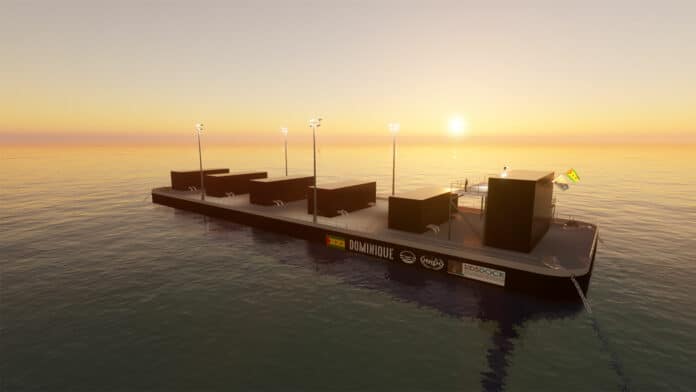In today’s world, where clean, renewable energy sources are becoming increasingly important, a 140-year-old technology is seeking to make a comeback. Known as ocean thermal energy conversion (OTEC), the technology was first proposed by a French physicist named Jacques Arsene d’Arsonval in 1881.
OTEC harnesses the temperature difference between sun-warmed surface water and the cold depths of the ocean to provide a continuous, cost-effective supply of clean energy for small islands and coastal nations.
Traditionally, OTEC systems use warm surface seawater to evaporate a low-boiling point fluid such as ammonia, which produces a vapor that spins a turbine to generate electricity. Cold water from deep in the ocean is then used to cool the vapor and condense it back into a liquid so the cycle can continue. This means it doesn’t need to use any fossil fuels like oil, gas, or coal to produce electricity.
It possesses significant environmental advantages over fossil fuels, and nuclear power requires less land than renewable energy technologies such as solar, wind, biomass, and hydroelectric power. Also, it has the potential to produce far more useful and affordable energy than could be generated from other renewable sources.
Despite the fact that it has the potential to match the combined capacity of all the world’s coal power plants, OTEC faces many technological and financial barriers, in addition to competition from more affordable renewable energy sources. Currently, only two pilot-scale OTEC plants in Hawaii and Japan are connected to the grid, generating enough power for a few hundred homes.
However, a UK-based startup, Global OTEC, is determined to overcome these challenges and lead an ocean energy renaissance. The company presented advanced concepts for Dominique, its next-generation Ocean Thermal Energy Conversion (OTEC) platform capable of generating 1.5MW, at last week’s International Vienna Energy and Climate Forum (IVECF) in Austria.
The platform harnesses the ocean waters using an array of OTEC modules and is set to be installed in São Tomé and Príncipe in 2025.
“We know Dominique is a life-changer for small islands and coastal nations, and that’s why we see the pace of the project on track for success. This is an important lesson we want to share with investors as the public-private partnership allowed the smooth undertaking of critical techno-economic, environmental, and social studies to progress to this point”, highlighted Global OTEC’s Founder and CEO Dan Grech.
Global OTEC opted for a unique floating barge design to address the expensive infrastructure requirements of traditional onshore OTEC plants. The design eliminates the need for multiple kilometer-long pipes fixed to the seabed, considerably reducing project costs.
Although the technology is still largely untested on this scale, Global OTEC is confident in its approach. It recently achieved a key design certification for Dominique’s cold-pipe technology, which is a critical milestone in its pursuit of viability.
Global OTEC will now conduct a geotechnical (seabed) survey and then finalize the detailed design of the project-specific system, followed by the construction and installation of the system. The company expects to start commissioning Dominique by the end of 2025.
Tropical islands face some of the world’s highest energy costs due to their imported fossil fuel dependency. But they have an abundance of sunshine, wind, and waves that offer immense renewable energy potential. Ocean thermal energy technology can complement intermittent renewables like wind and solar and provide these islands with baseload energy, significantly reducing their dependence on fossil fuels and paving the way for a greener and more sustainable future.
Unlike many conventional renewables, Global OTEC’s technology is also particularly suited to tropical islands and coastal cities because it requires significantly less space and generates power day and night, year-round. The company says its system can cut diesel costs by 25% to 50%, reduce costs and stabilize the price of electricity, reducing the frequency of blackouts. It requires 1/10th of the space needed by solar plants.
Dominique will play a key role not only for Sao Tome and Principe’s clean energy transition but for small island states worldwide, with the potential to decarbonize 10 GW of installed diesel capacity that needs to be replaced in the coming decade across SIDS DOCK’s 32 countries.
